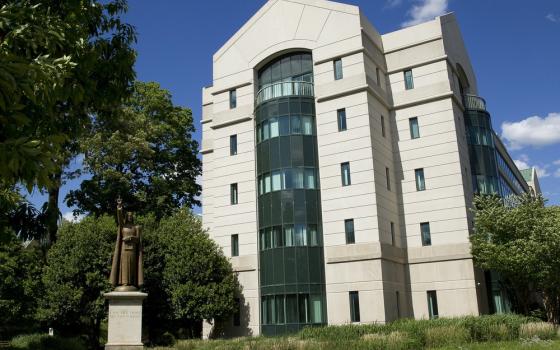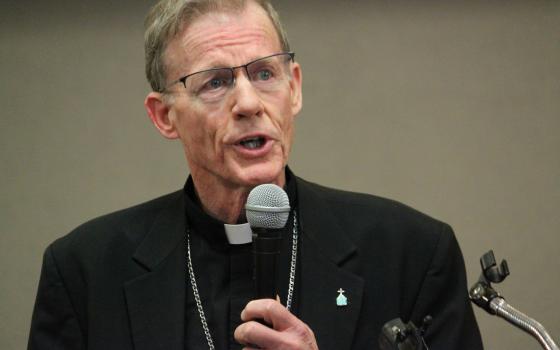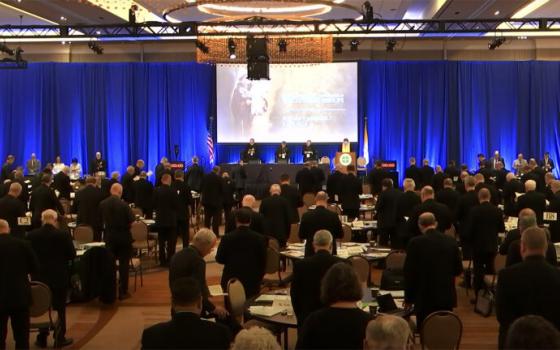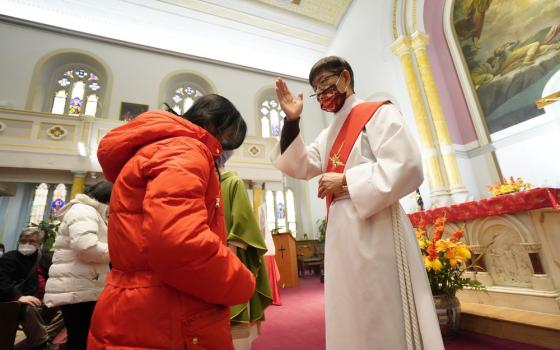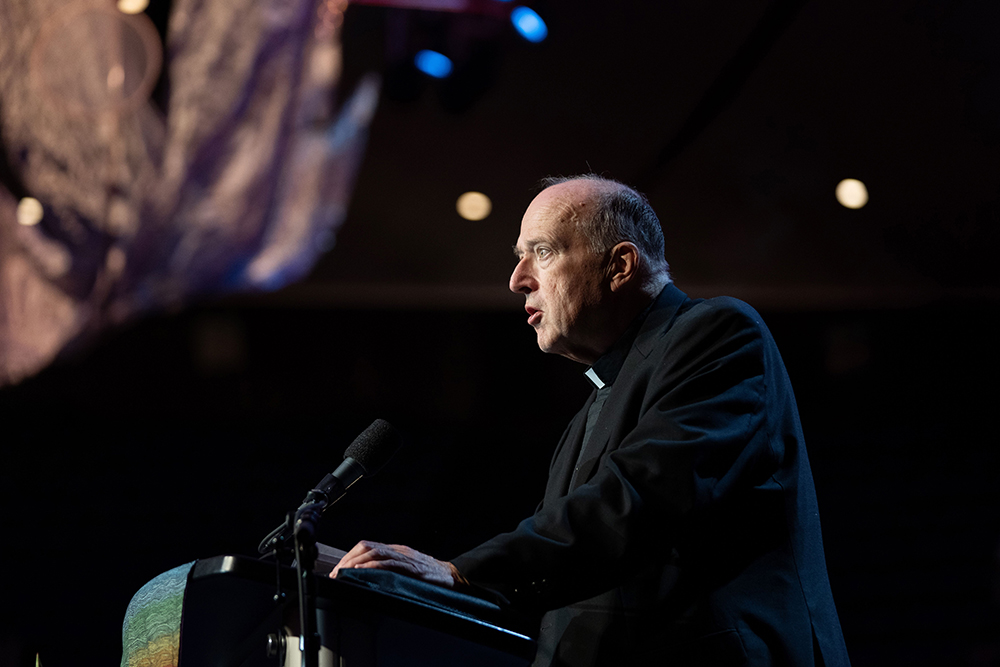
Cardinal Robert McElroy of San Diego speaks about his experience as a delegate to the Synod on Synodality in October 2023 at the Vatican during a talk Feb. 16, 2024, at the Los Angeles Religious Education Congress in Anaheim. (OSV News/Courtesy of Archdiocese of LA Digital Team)
The bishops are still in executive session this morning, but one issue has become a perennial and central part of all of their discussions: synodality. Of all the initiatives Pope Francis has begun, and which the U.S. bishops' conference has ignored, synodality is the one that can't be shunted aside.
Laudato Si' was passed off to outside groups and Amoris Laetitia received no real attention from the bishops' conference, but the body has been required to engage in the synodal process and it permeates almost every discussion.
So, while we wait for the public session this afternoon, I thought I would discuss the keynote address Cardinal Robert McElroy delivered Monday at the Catholic Health Association meeting in San Diego on the theme "The Synodal Challenge for Catholic Health Care in the United States."
McElroy began by outlining some of the general characteristics of the synodal process, along with specific reflections on his participation at the synod's general assembly in Rome last October. He then sketched four fundamental questions about the synodal process for Catholic health care to ponder, and while this sketch dealt with health care, it also showed how this process can be applied to other ministries and areas of church life.
Advertisement
The first question the cardinal articulated was how to "create and deepen analogical methods of discernment at all levels rooted in perceiving the presence of God, listening, truly listening, with profound respect to the voices of others, and [making] all feel included and respected." He noted that the Catholic Health Association has a "head start" on this because its ministries were rooted in consecrated religious life, but that the regulatory and economic headwinds of the ambient culture meant that such discernment would require "tremendous effort, commitment and conversion." It is easy to see how this insight applies to other ministries of the church too.
His second question was exceedingly thorny: "How should the doctrinal tradition and history of the church shape the church's ability to refine its teachings when confronted with a world where life itself is evolving in critical ways, and it is becoming clear that on some issues the understanding of human nature and moral reality upon which previous declarations of doctrine were made were in fact highly limited or time-bound?" This is a call for the renewal of moral theology, and the cardinal cited Pope Francis' motu proprio "Ad Theologiam Promovendam" and its call to integrate a more inductive theological method, as pointing the way forward. McElroy noted that practitioners of health care must bring their insights and experiences to bear on this renewal of Catholic moral theology.
The third question was how to "enflesh the pastoral stance of Jesus Christ," citing the synod document's recollection that in the Gospels "Jesus meets people in the uniqueness of their personal story and situation. He never begins from the perspective of prejudices or labels, but from the authenticity of relationship to which he commits himself wholeheartedly, even at the cost of experiencing rejection." The cardinal noted how difficult this can be for Catholic health care in a "hyper-competitive" environment to take the time to enflesh this pastoral dimension in their work.
He didn't mention it, but I will: Time spent in pastoral care, engaging patients as persons, is not "billable," at least not in this life and in our profit-driven health care system.
Time spent in pastoral care, engaging patients as persons, is not "billable," at least not in this life and in our profit-driven health care system.
The final question serves as a check on the second: "How the church's health care ministries must be a counter-cultural force in American society today." McElroy said that, in part, "this counter-cultural witness lies in helping society to answer the pivotal questions of moral choice, societal resource allocation and the purpose of health care in light of our Catholic understanding of human dignity and the resurrection." It also requires serving "those in society whom our culture ignores and discards: the destitute, the undocumented, the unborn, the mentally ill." It is incumbent upon Catholics' health care ministry to "take stances that will be rejected by both of the cultural poles which divide our nation on the questions of end of life, gender identity and the role of technology in medicine and science if it is to remain faithful to the Gospel of Jesus and Christ and the teachings of the church."
McElroy's talk evidenced the need to wrestle with these difficult issues and work through the competing elements of ministry, which is always an applied thing, defined in part by the need of the person to whom the ministry is directed, but rooted in the one in whom the ministry is conducted. Ministry inevitably involves tensions and the cardinal is suggesting that the synodal methods to which the pope has called the church are especially helpful to those in the ministry of Catholic health care, who are often on the frontlines of the culture wars.
These tensions are seen, too, in all the church's ministries. We must respond to the needs of the homeless drug addict, but we cannot feed his addiction. We must attend to the spiritual needs of our men and women in the armed forces, no matter our thoughts about the justice of this or that war. Our concern for the natural environment in a time of climate crisis cannot bring us to ignore the needs of those who toil in the extraction industries while we pursue a just transition to a carbon-neutral future. We can only navigate these challenges if we are attentive to the Spirit, and that attentiveness, while rooted in the Scripture and teaching of the church, must also include patient listening to the people of God through whom the Spirit speaks clamantly as well.
McElroy's talk, then, speaks to the challenges facing this highly divided bishops' conference. They cannot find unity on their own wits. It is only with the grace of holy wisdom, which synodality invites, that our nation's bishops will find a map to lead the church through the culture wars of our times.




